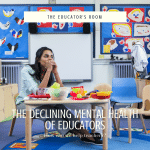Teacher burnout is not a new concept. If you’re connected to education in any way, you know that teachers are burning out more than ever. Educators are losing the spark they once had for the profession. Teachers are struggling with PTSD and resigning as a result of the declining state of education and the increased demands. As a result of the “teacher exodus,” there is a serious teacher shortage, with the majority of the shortage being in the most critical need areas.
With the increased focus on teacher burnout, there is a more specific reality for some teachers- demoralization. According to Doris Santoro, author of Demoralized: Why Teachers Leave the Profession They Love and How They Can Stay, “demoralization is rooted in discouragement and despair borne out of ongoing value conflicts with pedagogical policies, reform mandates, and school practices (p.3).”
As I reflected on my reality with PTSD as an educator, I realized my experience aligned more with demoralization than burnout. When comparing the two terms, Santoro says, “burnout is a common explanation for why experienced teachers are dissatisfied with their work. When teachers find out they have reached the limit of what they are able to sustain personally and professionally, they may be experiencing burnout.” Demoralization, on the other hand, has the following characteristics:
- Teachers believe they are violating basic moral expectations that educators should embody: do no harm to students, support student learning, engage in behavior becoming of a professional.
- Teacher distress that can lead to isolation, despair, transfer to other schools, and to leaving the profession entirely.
- Teachers are overall unable to do what needs to be done (as a result of school and district policies, etc.)
My experience with demoralization included was based on the belief that I was doing harm to students’ overall well-being due to increased demands unrelated to the needs of the individual students. In my most recent year in the classroom, I was a third-grade teacher and I co-taught students receiving special education services. There were varying academic levels: from kindergarten upwards to fifth grade. The lessons I planned, specifically for my struggling learners, were not up to the standard of my administration. As an educator with a Master’s degree in Behavior and Learning Disabilities, I put my training to work by planning as many individualized and differentiated lessons as possible. However, my work as a professional was constantly questioned. I can’t count the number of times the term rigor was brought up to me. I know what my students needed. Slowly, I was seeing steady results.
Unfortunately, benchmark scores did not demonstrate high scores. My grade level was constantly scrutinized. I was truly under a lot of pressure to make more happen than what I could do as one person.
As a result of this, I would dread going to work daily because some of my students were not growing in the way I knew they should. I simply didn’t have the autonomy to meet all the different needs. I believed I was falling short of doing what was truly best for kids. With the varying academic levels in my classroom, I was overwhelmed and under-supported. I became demoralized early in the school year when I realized that my vision and that of administrations’ was different. I truly believed I was doing overall harm to my students. I felt this way because I knew their needs were not being met, at no fault of my own. I was running in a race that I would never win. I was reprimanded more times than I care to admit, which caused me to feel shame and embarrassment. I did what no teacher plans to do when they first enter the profession: I resigned from the classroom.
[bctt tweet=”I truly believed I was doing overall harm to my students.” username=””]
As you can see, demoralization goes deeper than simply teacher burnout. Demoralization is a result of various factors such as harming students a degrading of the profession by society. Teachers are constantly being flooded with new ideas and initiatives. We have been forced to become jacks of all trades but are ending up as masters of none.
It’s time to acknowledge the unfortunate state of the demoralized teacher.






